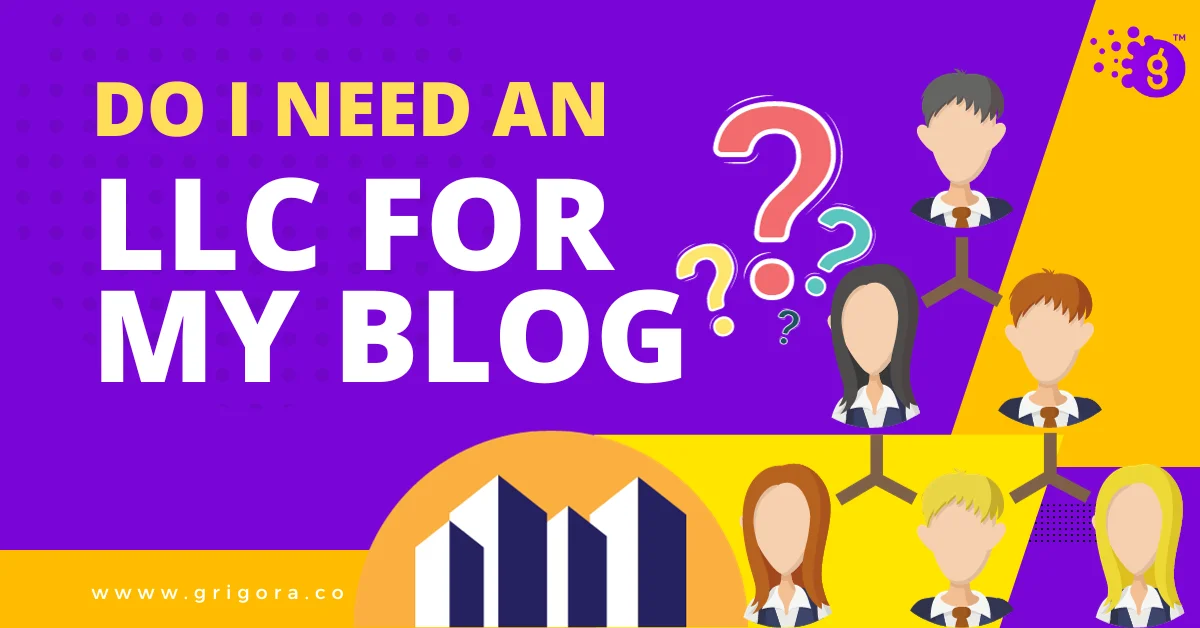Introduction
The Rise of Blogging as a Business
In the business world, the rearview mirror is always clearer than the windshield.
Warren Buffett
In recent years, blogging has evolved from a hobby or side hustle into a viable career option. The rise of blogging as a business is not just a trend but a significant shift in how content is created, shared, and monetized. Bloggers are now entrepreneurs, managing everything from content creation to marketing and revenue generation.
Legal Considerations for Bloggers
As the stakes get higher, so do the responsibilities. Legal considerations are no longer an afterthought but a crucial aspect of running a successful blog. From copyright issues to contracts with advertisers, legal compliance is a field that bloggers can no longer afford to ignore.
Why the Question of Forming an LLC Arises?
The question of whether to form an LLC (Limited Liability Company) often comes up, especially when a blog starts to generate substantial income or when it involves more complex operations like selling products or services. An LLC can provide benefits like liability protection and potential tax advantages, but it also comes with its own set of challenges and responsibilities.
In this comprehensive guide, we will explore whether forming an LLC for your blog is the right step for you, the advantages and disadvantages of doing so, and the procedures involved in setting up an LLC.
What is an LLC?
Definition and Basics of an LLC
An LLC, or Limited Liability Company, is a business structure that combines the flexibility of a partnership with the liability protection of a corporation. In simpler terms, it's a legal entity that separates your business assets from your personal assets, offering a layer of protection against personal liability for business debts or legal issues.
How an LLC Differs from Sole Proprietorships and Corporations
The LLC is often considered a hybrid business structure because it incorporates features from both sole proprietorships and corporations. Here's how it differs:
Sole Proprietorships: In a sole proprietorship, the business and the individual are legally the same entity. This means that while it's easy and inexpensive to set up, the individual is personally responsible for all business debts and liabilities.
Corporations: A corporation is a separate legal entity that provides the most personal liability protection but comes with more regulatory requirements and may be subject to double taxation.
An LLC offers a middle ground, providing liability protection without the rigorous requirements and potential double taxation of a corporation.
Advantages of Forming an LLC for Your Blog
Liability Protection
One of the most compelling reasons to form an LLC for your blog is the liability protection it offers. In the event of a lawsuit or debt collection, your personal assets such as your home, car, and personal bank accounts are generally protected from being seized to settle business debts.
Tax Benefits
An LLC offers flexibility in how you're taxed. By default, LLCs are taxed as "pass-through" entities, meaning that business profits and losses are passed through to the individual members who report this income on their personal tax returns. This avoids the "double taxation" that corporations are subject to. However, LLCs can also choose to be taxed as corporations if that is more beneficial.
Enhanced Credibility
Forming an LLC can also add credibility to your blog. Partners, vendors, and readers may view an LLC as a more professional and legitimate operation compared to a sole proprietorship.
Disadvantages of Forming an LLC
Costs Involved
While forming an LLC offers numerous benefits, it's not without its drawbacks. The initial setup can be costly, involving state filing fees, and possibly attorney fees if you seek legal advice.
Paperwork and Formalities
An LLC requires more paperwork and ongoing formalities than a sole proprietorship, including the filing of articles of organization and the creation of an operating agreement.
Possible Tax Complexity
While the "pass-through" taxation can be a benefit, it can also lead to complexity in your personal tax return, as business profits and losses are reported here.
When Should You Consider an LLC for Your Blog?
Revenue Generation
If your blog is generating significant revenue, it may be time to consider forming an LLC. The more money your blog makes, the more attractive it becomes for legal disputes. An LLC can provide an extra layer of protection for your personal assets.
Team Members and Employees
Hiring team members or employees is another milestone that could make an LLC a wise choice. Employment-related issues can result in legal complications, and an LLC can offer you some protection in such scenarios.
Legal Risks and Liabilities
If your blog is in a niche that is prone to legal risks, such as health advice, financial planning, or legal tips, forming an LLC can be a prudent move to separate your personal and business liabilities.
How to Form an LLC

Choosing a Business Name
The first step in forming an LLC is choosing a business name that is not already in use and typically ends with "LLC." You'll need to check the availability of the name in your state and possibly register a trademark.
Filing Articles of Organization
The next step is filing the Articles of Organization with your state's Secretary of State office. This document outlines the basics of your business, including the name, purpose, and members.
Creating an Operating Agreement
Although not always required, it's highly recommended to create an Operating Agreement. This internal document outlines how the LLC will be run, including the division of profits and losses, member responsibilities, and other operational details.
Obtaining EIN and Opening a Business Bank Account
Finally, you'll need to obtain an Employer Identification Number (EIN) from the IRS for tax identification. With this, you can open a business bank account, separating your personal and business finances.
Obtaining EIN and Opening a Business Bank Account
Finally, you'll need to obtain an Employer Identification Number (EIN) from the IRS for tax identification. With this, you can open a business bank account, separating your personal and business finances.
Costs of Forming and Maintaining an LLC
Initial Filing Fees
One of the first costs you'll encounter is the initial filing fee for the Articles of Organization. This fee varies by state but generally ranges from $50 to $500. Some states also require a publication fee, where you must announce your LLC formation in a local newspaper.
Ongoing State Fees
Annual or biennial state fees are another cost to consider. Known as a "franchise tax," "annual report," or "statement of information," this fee can range from $0 to several hundred dollars, depending on your state and the complexity of your business.
Other Potential Costs
Additional costs may include hiring a registered agent, legal fees, and accounting services. These are not mandatory but can add to the overall cost of maintaining an LLC.
Alternatives to an LLC
Sole Proprietorship
For bloggers who are just starting out or who have minimal revenue and risk, a sole proprietorship is the simplest and least expensive option. However, it offers no liability protection.
Partnership
If you're running the blog with another person, a partnership could be a suitable choice. Like a sole proprietorship, it's easy and inexpensive to set up but lacks the liability protection of an LLC.
Corporation
For larger blogs with significant revenue and perhaps multiple employees, a corporation could be the most appropriate structure. It offers the most robust liability protection but is the most complex and expensive to set up and maintain.
Case Studies
Bloggers Who Benefited from Forming an LLC
Understanding real-world scenarios can provide valuable insights into whether forming an LLC is the right move for you. For instance, a tech blogger who started selling software through their blog found that forming an LLC provided essential liability protection. Another case involves a travel blogger who partnered with various brands; the LLC structure made these partnerships more straightforward and legally secure.
Scenarios Where an LLC Wasn't Necessary
On the flip side, there are also instances where forming an LLC may not offer significant advantages. A hobbyist blogger with no revenue streams and minimal visitor traffic found the costs and paperwork of an LLC to be unjustifiable. Another example is a freelance writer who used their blog solely as a portfolio; for them, the simpler structure of a sole proprietorship was more than sufficient.
FAQs
Is it expensive to form an LLC?
The cost of forming an LLC varies by state and can range from $50 to $500 for the initial filing. Some states also have ongoing fees, such as annual reports or franchise taxes. It's essential to budget not just for the initial costs but also for any recurring fees.
Can I convert my existing sole proprietorship blog to an LLC?
Yes, converting a sole proprietorship into an LLC is generally straightforward. You'll need to go through the standard LLC formation process, including filing Articles of Organization and creating an Operating Agreement. You'll also need to update your tax IDs and business licenses.
What are the tax implications of forming an LLC for my blog?
Tax treatment for LLCs can be flexible, but it's crucial to understand your options and responsibilities. An LLC can be taxed as a sole proprietorship, partnership, or corporation, depending on various factors like revenue and number of members. Consult a tax advisor for personalized advice.
Do I need to renew my LLC periodically?
Most states do not require LLCs to be renewed, but they do have reporting requirements, often annual, to keep your LLC in good standing. Failure to meet these requirements can result in fines or even dissolution of the LLC.
Conclusion
Weighing the Pros and Cons
The decision to form an LLC should not be taken lightly. It involves both time and financial investment but offers benefits like liability protection and potential tax advantages. Always consult with legal and financial advisors to make the most informed decision.
Consulting with Legal and Financial Advisors
Before making any significant legal or financial moves, it's highly advisable to consult professionals in the field. They can provide personalized advice tailored to your specific circumstances and long-term goals.



